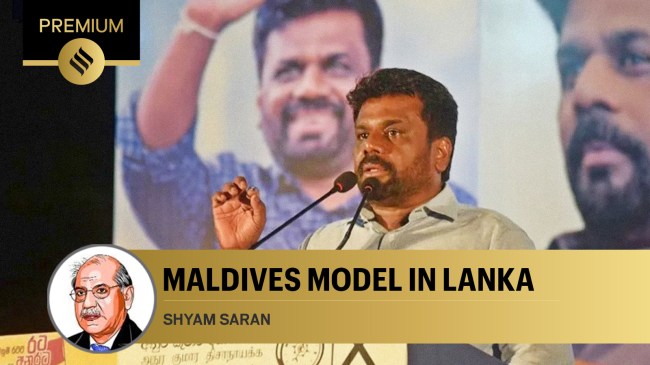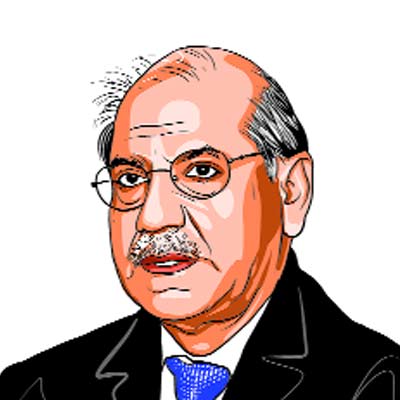Opinion Shyam Saran writes: Why political uncertainty in Sri Lanka may not mean it draws away from India
New President Anura Kumara Dissanayake has recognised the importance of India for Sri Lanka’s security and economic development. He has not given any indication of prioritising relations with China over India
 Anura Kumara Dissanayake, leader of the National People's Power (NPP) party.
Anura Kumara Dissanayake, leader of the National People's Power (NPP) party. The year 2024 has witnessed several setbacks to India’s Neighbourhood First Policy. The recent election results in Sri Lanka may be the latest among them. Pakistan has reverted to escalating cross-border terrorism against India. Nepal has had yet another change of government and K P Oli, who had presided over an unprecedented worsening of bilateral relations, is Prime Minister again. A Bangladesh student movement morphed into a much wider anti-government revolt against Prime Minister Sheikh Hasina. She had to flee from her country and seek refuge in India. India has been seen as complicit in her anti-people and corrupt policies, and there is widespread popular anger and resentment against it. More worrying is the resurfacing of radical Islamic elements of the Jamaat and a revival of Pakistani influence in the country. There is a serious security situation looming large in India’s sensitive Northeast, where a dangerous inter-ethnic conflict in Manipur, a violent civil war in Myanmar and now an unstable and hostile situation in Bangladesh, could become intertwined and make India’s eastern flank both unstable and volatile.
Another zone of unpredictability is emerging in India’s southern maritime domain. This may multiply security threats over a wide swathe of India’s periphery. A hostile regime in the Maldives has already tested our diplomatic mettle. There is a real possibility that Sri Lanka’s recent presidential elections could become another inflexion point. Anura Kumara Dissanayake has been elected President at the head of the National People’s Power (NPP), of which the chief constituent is his left-wing radical Janatha Vimukthi Peramuna (JVP). This is the first time that none of Sri Lanka’s mainstream political parties will be ruling the country. A pervasive resentment and frustration with successive governments, which mismanaged the economy and were guilty of widespread corruption, opened the doors to an outsider who skillfully exploited the popular angst against the ruling elites.
The JVP has reinvented itself politically, shedding its historical baggage as a violent left-wing and ultra-nationalist movement, which was involved in two bloody insurrections, one in 1971 and the other in 1987. Its ultranationalism was, of course, directed against India, as is the case with most of our neighbours. While in its present incarnation, the JVP may have foresworn its violent tactics, it continues to harbour a radical wing. It is likely to serve up populist policies, which will inevitably derail the fragile economic recovery of the past two years. Dissanayake has declared his intention to renegotiate the terms on which Sri Lanka has received IMF support, which the latter is unlikely to accept. There is likely to be greater state intervention in the economy and a review of several major private sector projects. Dissanayake has threatened to cancel the solar power project being undertaken by India’s Adani group in northern Sri Lanka. The group is also undertaking a very large container port project in Colombo with $553 million in financial support from the
US International Development Finance Corporation. Would that be in jeopardy as well?
India cannot afford prolonged political turmoil and economic disruption in its southern periphery. Could the responsibility of office bring about a more sober and realistic approach from the new government in Colombo?
Things may not be entirely clear until the current parliament is dissolved, and a new Prime Minister is appointed after parliamentary elections. This may take place sooner than later. The NPP would want to profit from the political momentum it currently enjoys and hope to win a majority, but elections are always uncertain. It may be better to let the new politics play itself out before passing judgement over what one may expect from the new government in Colombo. In the case of the Maldives, there was a sober and mature handling of an overtly hostile regime, allowing the reality of a dense economic interdependence to bring about a shift in attitudes in Male. In the case of India and Sri Lanka, too, there is a strong economic interdependence. The economic viability of Colombo port depends upon transhipment traffic from India. Added to that is the significant support that India extended to Sri Lanka during the height of its economic crisis in 2022. This included a currency swap, supplies of fuel, rice and medicines and a large financial package. These are estimated to be around $4 billion.
Such economic interdependence may serve to smoothen the jagged edges that politics may serve up. The Maldives template is a good one to follow for Sri Lanka.
The Modi government has been charged with putting all its eggs in the Sheikh Hasina basket in Bangladesh and not reaching out and engaging with political constituencies other than the ruling Awami League. Some lines of communication were maintained with the opposition Bangladesh Nationalist Party, but not with the anti-Indian Jamaat. In the case of Sri Lanka, it was apparent several months before the elections that Dissanayake and his NPP may win the elections. He was invited as a guest of the Indian government in February 2024 and held talks with External Affairs Minister S Jaishankar and with National Security Advisor Ajit Doval. This was a good move.
Dissanayake has recognised the importance of India for Sri Lanka’s security and economic development. He has not given any indication of prioritising relations with China over India. One should expect that he will seek to maintain a careful balance in
Sri Lanka’s relations with India and China. Balance is preferable to leaning towards China.
There is a tendency to consider our policies towards each of our neighbours as independent variables. To some extent, the specificity of each neighbourly relationship must be kept in mind. But there is an urgent necessity to draw up a comprehensive neighbourhood strategy. This should identify what are the assets and what are the liabilities in engaging with each of our neighbours but also locate these bilateral relations in a larger pursuit of regional economic integration. This would seek to leverage the role that India could play as the engine of growth for all its neighbours, as the node for a regional transport and communications network and, increasingly, as the leader in helping the region tackle, collaboratively, for example, the urgent challenge of climate change. Leading the Global South must begin with our own subcontinental neighbours.
The writer is a former foreign secretary





